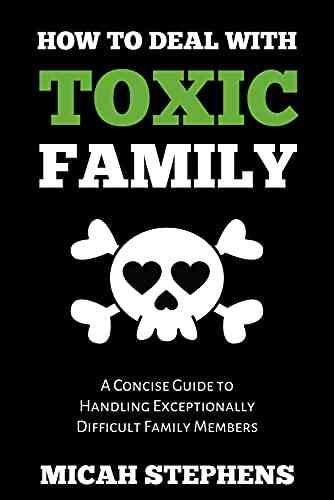Family is a beautiful part of our lives that provides love, support, and understanding. However, sometimes we may encounter exceptional difficult family members who challenge our peace and harmony. Whether it's a demanding or manipulative parent, a toxic sibling, or a distant relative, dealing with such individuals can be emotionally draining and distressing. In this guide, we will explore effective strategies to handle these exceptional difficult family members while maintaining your own well-being.
Understanding the Dynamics
Before diving into handling difficult family members, it's crucial to understand the dynamics at play. Each individual comes with their own set of experiences, traumas, and insecurities. These underlying factors can greatly affect their behaviors and interactions with others. By gaining insight into their background, you can develop empathy and devise personalized strategies to deal with their complexities.
Setting Boundaries
One of the most effective ways to handle exceptional difficult family members is to establish clear boundaries. This involves clearly communicating your limits and expectations in a calm and assertive manner. By setting boundaries, you protect your emotional and mental well-being while still maintaining a relationship, albeit a healthier one. Remember, it's okay to say no and prioritize your own needs.
5 out of 5
| Language | : | English |
| File size | : | 932 KB |
| Text-to-Speech | : | Enabled |
| Enhanced typesetting | : | Enabled |
| Word Wise | : | Enabled |
| Print length | : | 18 pages |
| Lending | : | Enabled |
| Screen Reader | : | Supported |
Effective Communication
Communication is key when it comes to managing difficult family members. Effective communication involves active listening, expressing yourself clearly, and avoiding confrontational language. Use "I" statements to express how their behavior affects you, creating a non-reactive space for discussion and understanding. This approach can help foster healthier communication patterns and potentially bring about positive changes in their behavior.
Practicing Empathy
Difficult family members often have their own struggles and challenges that contribute to their behavior. By practicing empathy, we try to understand their perspective and acknowledge their emotions. This doesn't mean excusing or enabling their behavior, but rather developing a compassionate mindset that can facilitate healthier interactions. Empathy can lead to more constructive conversations and reduce tension within the family dynamics.
Seeking Professional Help
Sometimes, handling exceptional difficult family members may require outside assistance. Consulting a therapist or counselor can provide you with the guidance and tools needed to navigate complex family relationships. A mental health professional can help you develop coping mechanisms, improve communication skills, and offer unbiased support during challenging times. Don't hesitate to seek professional help if you feel overwhelmed or stuck.
Self-Care and Support
Dealing with difficult family members can be emotionally draining, so it's crucial to prioritize your self-care. Engage in activities that bring you joy, practice relaxation techniques, and seek support from friends or other family members who understand your situation. Surrounding yourself with a supportive network can provide a sense of validation, reassurance, and comfort during challenging times. Remember, taking care of yourself is not selfish but essential for maintaining overall well-being.
Handling exceptional difficult family members is a delicate and complex process. However, with empathy, effective communication, and self-care, you can navigate these challenging relationships while safeguarding your own well-being. Remember, you're not alone, and seeking professional help when needed is a sign of strength rather than weakness. By implementing the strategies outlined in this guide, you can foster healthier dynamics within your family and maintain a sense of peace and harmony in your life.











































































